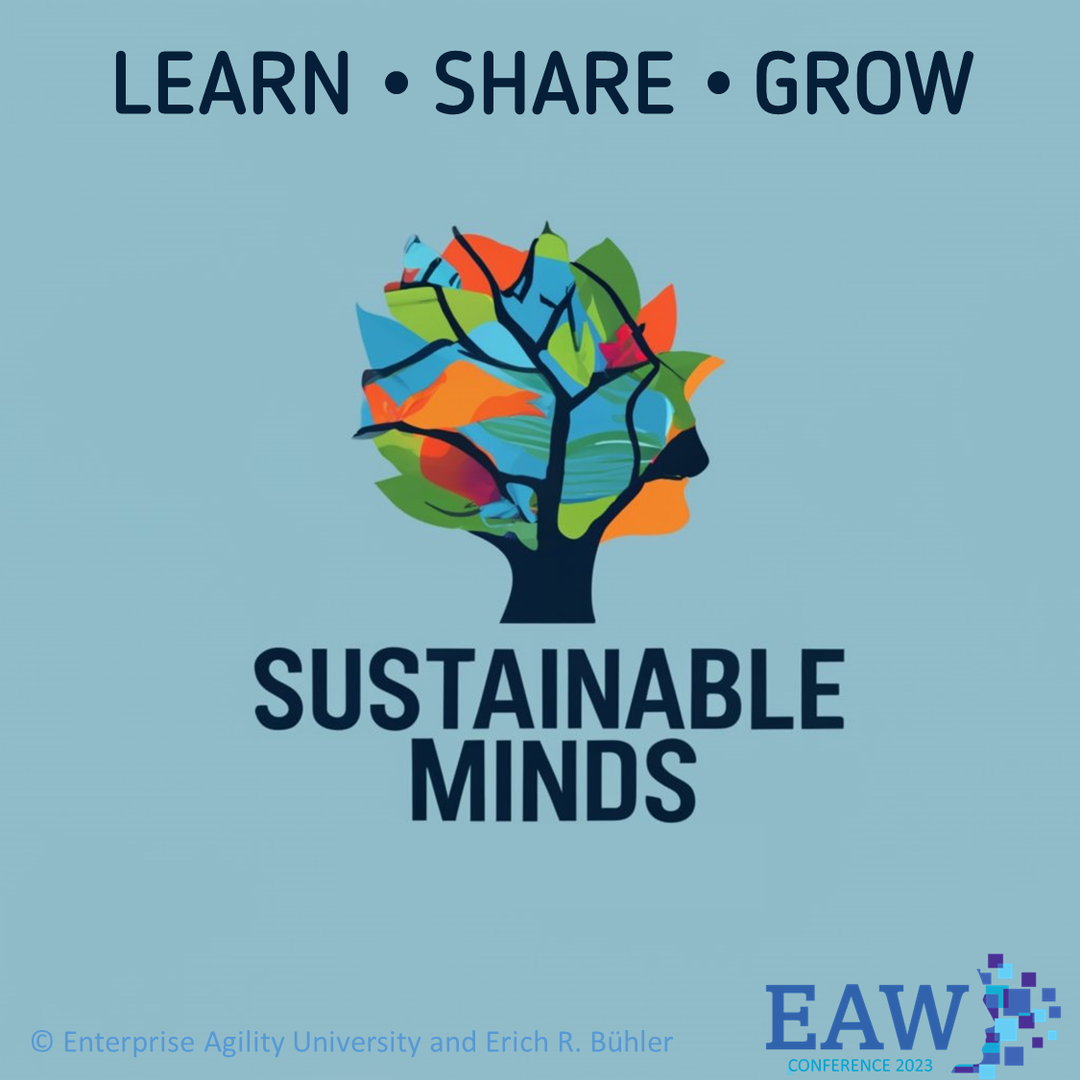Sustainable Minds in Enterprise Agility Ecosystem refers to cultivating mindsets and mental models that support continuous learning, adaptation, and shared progress in the face of high uncertainty and constant change, regardless of what walk of life the person comes from.

It is characterized by:
- Intellectual Humility - A willingness to acknowledge the limits of one's knowledge and remain open to new paradigms. Practicing curiosity over conviction.
- Mental Agility - Believing abilities can be developed through effort and the right strategies. Challenges are opportunities to expand capabilities.
- Future Thinking- Considering long-term implications and how today's choices impact the future to build shared progress. Focused on sustainable renewal.
- Systems thinking - Recognizing interconnections between parts of a whole and how they shape outcomes. Avoiding siloed or narrow views.
- Sensing - Sensing one's emotional responses skillfully and constructively sensing others even during uncertainty or adversity. Staying focused on goals.
Sustainable Minds are never static. They are oriented towards constant improvement and expansion in service of Shared Progress. By cultivating these qualities across an organization or society, its capacity for flexibility and sustainable resilience is strengthened from the inside-out.
Times of disruption, such as layoffs, extreme uncertainty, and market acceleration, often trigger anxiety, stress, and a sense of powerlessness. These psychological states inhibit adaptability by limiting perspective and causing people to cling rigidly to assumptions that no longer fit reality.
Sustainable Minds counteract this tendency in several ways. They promote intellectual humility and a growth-oriented mindset that suppresses defensive instincts and opens people to new paradigms. Systemic and Future thinking is encouraged, balancing short-term short-circuit reactions by considering broader implications and charting an adaptive course.
Emotion regulation skills enable people to deal constructively with fear, anxiety, and anger rather than lashing out or becoming paralyzed (Demobilized, check the M-Leadership Frameworks for more details about mobilization).
In addition, Sustainable Minds promotes collaboration and collective resilience. Instead of pitting people against each other, they are brought together as partners facing common challenges and pursuing a common goal. This strengthening of community is critical to build Shared progress.
Sustainable Minds are vital for supporting mental and physical health during times of intense, accelerated change. Health cannot be an afterthought—it must be woven into strategies for adaptability and Shared progress.
Finally, the focus is on continuous learning and improvement, seeing turbulence as an opportunity for innovation, creative problem-solving, and inventing a better future.
A sustainable mind is an important part of the Enterprise Agility Way of Thinking (EAWT) represented by a Sustainable Player.
By fostering these qualities, Sustainable Minds psychologically buffer people from threats while keeping them flexible and creative. In this way, organizations can manage massive upheavals with agility, emerge stronger, and continue to evolve. Sustainable Minds transform challenges into catalysts for a more positive future.
What is the Connection with Sustainable Players in Enterprise Agility?
Sustainable Minds are an essential trait embodied by Sustainable Players in organizations navigating exponential markets and upheavals. As mentioned earlier, Sustainable Players are our perspective of a person in the company with a long-term, holistic view focused on mutual benefit, shared progress, and positive contributions to all stakeholders. This mindset requires sustainable capabilities, which Sustainable Minds provides. From the social perspective, Sustainable players consider Adaptive trust and Adaptive social contracts in everything they do (MLE Framework).
Above all, Sustainable Players need the Intellectual humility to recognize the limits of their own knowledge and remain open to new ideas. They need a growth mindset to develop new skills and strategies to meet changing challenges. They need to sense themselves and others to overcome fear, anger, or complacency and focus on constructive goals.
Systems thinking enables Sustainable Players to see connections and make decisions that have far-reaching implications. Future Thinking leads to balancing long-term impacts with short-term needs. This broadens perspective and enables the flexibility Sustainable Players need to drive strategic innovation and continuous adaptation.
By modeling Sustainable Minds, individuals influence and mobilize others in the society or organization to develop similar cognitive flexibility and resilience. This creates a culture of learning and collective empowerment to deal with uncertainty and builds Shared Progress.
For organizations and society to evolve sustainably, their leaders must have the ability to see and inspire ways forward. Sustainable Minds foster the leadership qualities that are critical to shared progress and success!
